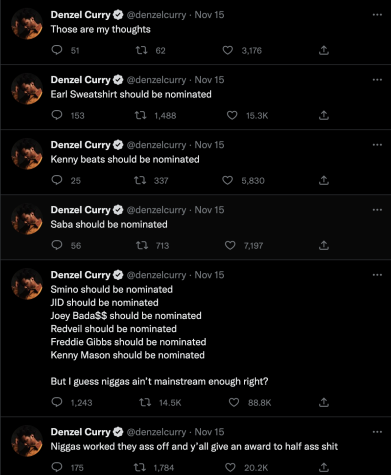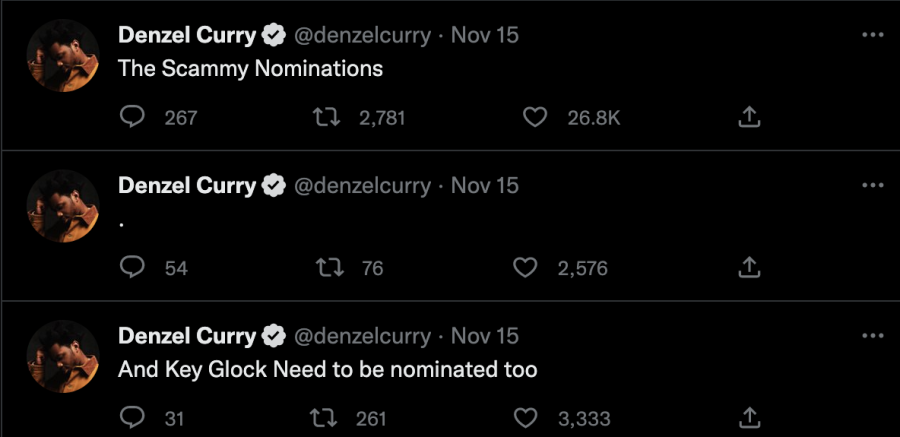Why Do The Grammy Nominations Always Suck?
As per usual, the 2023 Grammy nominations were a let-down (at best) for music artists and listeners everywhere. But why are they always so out of touch, and how are they even decided?
December 6, 2022
Year after year music fans are consistently disappointed by the Recording Academy’s Grammy Award nominations, and this year is no different. Both listeners and actual artists are fed up with the clear favoritism and bias within the nomination and voting process. For example, this string of tweets by rapper Denzel Curry accurately sums up how some rap enthusiasts felt on Nov. 15:

After reading those tweets, I thought to myself, “For real, how is DJ Khaled nominated for best rap album, and all of those artists Denzel listed were not?” Then I wondered another thing – does anyone actually know why the Grammy nominations suck so bad? How are these nominees even decided? Who are the people thinking to themselves, “Yeah, Jack Harlow’s new album is definitely on the same plane as Kendrick Lamar’s and is surely better than Earl Sweatshirt’s project.” So, I didsome research for all of us who are outraged at the ridiculous picks the Grammys roll out each year.
According to the Recording Academy’s official website, members of the Recording Academy and record companies submit musical works created during the year’s eligibility period that they think should win a Grammy. These works are then screened by “more than 350 experts in various fields” to ensure they fulfill “specific qualifications” (which are not listed) and determine which genre category they will be submitted for.
After this, the nomination process finally starts. Members of the recording academy are “directed” to only vote in areas of their expertise, and are allowed to vote in ten categories across up to three genre fields, and every member votes on the four general awards (Record Of The Year, Album Of The Year, Song Of The Year and Best New Artist). These nominations are finalized by committees of members from all The Academy’s Chapter cities, and are then announced.
From only looking at the Academy’s website, an issue has already risen in this process. Members of the Academy must be well connected. They have to receive multiple recommendations from well-respected peers in the music industry, have a successful career in music and have released a specified amount of musical content commercially. You also have to commercially distribute your music, meaning you must be financially benefiting from the consumption of your work. You have to either create physical copies of music like CDs and vinyl to sell in stores, or you have to put your music on Spotify, iTunes, Amazon, YouTube, etc. Small and independent artists are already at a disadvantage. In order to become a member of the Academy and submit anything, which means you must have enough money and connections, which take a lot of time, luck and success to build up.
The submission process is also supposedly a nightmare. As a 2016 article from Vox says, “If you are on a major label, your label might hold back your album in favor of one they think might have a better shot. If you are on a small label, your representation might not have any idea how to submit at all.” Even if smaller artists have the means to become a member of the Academy, their work has a minuscule shot of even being submitted for a Grammy award.
The Grammys supposedly honor “artistic achievement, technical proficiency and overall excellence in the recording industry, without regard to album sales or chart position,” but when the only ones submitting and voting are the chart toppers with high sales, that statement means next to nothing. The Grammys seem so disconnected from regular music listeners because voting members are typically not going to vote for who they actually think is the best. Rich successful people will vote for their rich successful friends who made them rich and successful in order to stay rich and successful.
Along with the bias of many voters, the Academy “directs” members to only vote in categories of their expertise. The choice of the word “direct” shows that this is not a requirement, just a suggestion. So, if a member is voting in a category which they are unfamiliar with for whatever reason, they are almost definitely going to either vote for one of their friends or for the most popular artist, since they’ve heard of them before. This pretty much ensures that only the most popular artists have a chance at even getting nominated and that, once again, small artists are screwed.
Remember the Academy’s mention of “committees” who finalize the nominations? Not much is known about them, as the Academy purposely keeps their identities secret and shares little about their operations, but most of what is known comes from whistleblower Deborah Dugan. In late 2019 to early 2020, right before the 2020 Grammys, Dugan was put on leave from her position as CEO of the Recording Academy. In response, she exposed much about the favoritism and unfairness of the nomination process, as well as the Academy’s alleged internal issues with racism, sexism and sexual misconduct.
Regarding these committees, Dugan stated in her complaint/lawsuit that they put their own financial interest above the actual mission of the Grammy awards. They often push forward artists with whom they have relationships, and ensure that certain works are nominated if a producer wants it performed during the awards show.
An example she discusses is “One artist who initially ranked 18 out of 20 in the 2019 ‘Song Of The Year’ category ended up with a nomination. This artist was actually permitted to sit on the ‘Song Of The Year’ nomination committee. Incredibly, this artist is also represented by a member of the board.” The fact that artists can either be represented by committees or actually sit on them themselves is outrageous.
Other issues that Dugan and many artists, such as Nicki Minaj, have pointed out include the clear lack of diversity within the general awards category. Album/song/record of the year awards almost never go to R&B or rap artists, most of whom are people of color, or non-men. Along with this, almost all voting members are white and/or male. Especially for genre categories like rap and R&B, this is a huge issue, and shows why the nominations are all so out of touch. Music created by Black people is being judged by white people, who do not experience the issues explored in much of these works and do not understand the creative processes and extensive backgrounds of these genres.
To give the Recording Academy some credit, they are attempting to fix some of these issues (only after Deborah Dugan surfaced them, of course). On the Grammy website, a page detailing the changes made for last year’s 64th awards show claims that “The nominations review committees in general and genre fields have been eliminated,” and that voters will now only be allowed to vote in ten categories, less than the previous fifteen, across three genre fields. The Recording Academy has also been making the same half-hearted attempts as many other large companies to increase diversity, but that entire process will take a long time to actually change anything, as much of it comes from the institutions in the music industry that have been built over many years.
The Grammys still suck, and with a significant amount of research, I have finally found out why- but this stuff is not necessarily on the surface for the typical music listener fed up with the Academy to find and inform themselves about, which makes sense, but is a real shame.
Even though my hatred for the Grammys has only grown throughout creating this article, I will still be tuning in February 5th to yell at my screen if “abcdefu” by GAYLE wins Song Of The Year or if DJ Khaled wins literally anything in the rap categories.


Shanon ~ Feb 5, 2023 at 2:58 pm
They are completely out of touch with fans of artists.